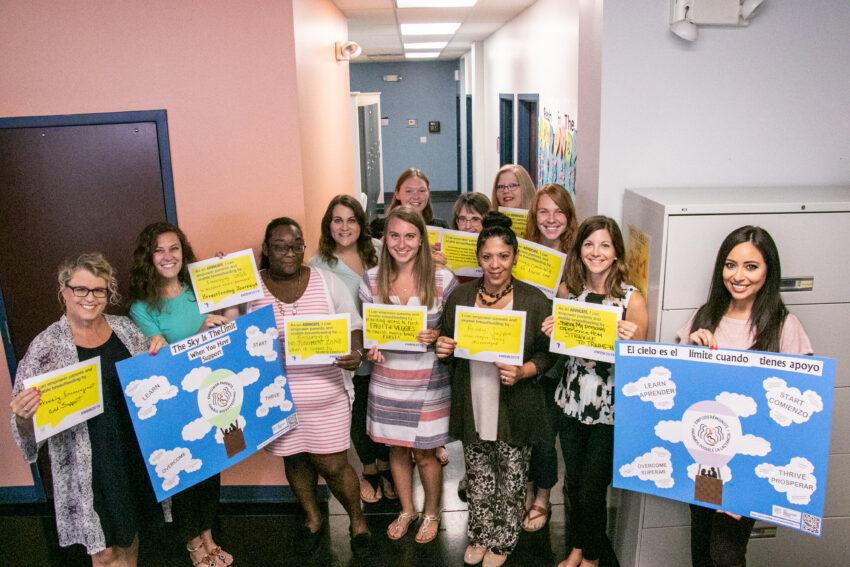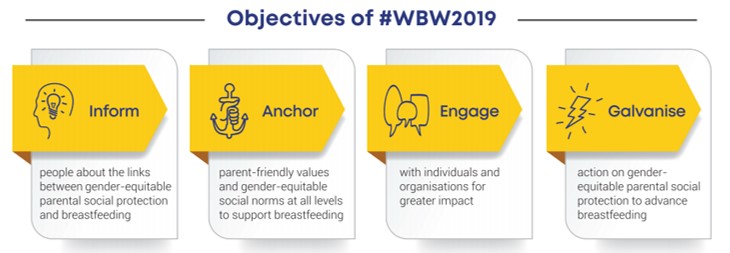World Breastfeeding Week 2019


“Global standards that are inclusive and promote decent work, sustainable economic growth and employment for all are essential. Decent work should include parental social protection that protects, promotes and supports breastfeeding”
World Alliance for Breastfeeding Action (WABA)
Breastfeeding reduces maternal and child morbidity and mortality. Breastfed children have higher intelligence, and not breastfeeding results in economic losses of about $302 billion annually. It is evident that breastfeeding is one of the best investments in saving lives and improving the health, social and economic development of individuals and nations. However, despite international recommendations, only 40% of all babies under 6 months are exclusively breastfed and 45% continue breastfeeding up to 24 months. Sustaining and scaling up optimal breastfeeding include supporting parents at work.
Inequalities such as gender discrimination and lack of support for parents at work stand in the way of sustainable development. Globally, a mother’s return to paid work after childbirth is one of the leading reasons for early cessation of breastfeeding. More than 830 million women workers do not have adequate maternity protection. It is also important to note that more than half (61.2%) of the global workforce make their living in the informal economy and are not covered by maternity protection policies. Breastfeeding mothers in the informal economy face additional barriers such as living far from work, long working hours without breaks, and dangerous work environments. The challenges of paid work are exacerbated by the unequal distribution of care work, with the assumption of females as sole caregivers. Furthermore, the International Labour Organization (ILO) reports that only 78 out of the 170 countries studied offer paternity leave. Lack of paternity leave limits the time fathers can spend with their partners and children after birth. Additionally, child health and social services often ignore or exclude fathers and do not inform them about breastfeeding support.
World Breastfeeding Week 2019 campaign aims to address labour and gender inequalities to protect, promote and support breastfeeding. World Breastfeeding Week (WBW) is a global campaign coordinated by the World Alliance for Breastfeeding Action (WABA) that aims to inform, anchor, engage and galvanise action on breastfeeding and related issues. The #WBW2019 theme is ‘Empower parents, enable breastfeeding.’ #WBW2019 advocates for (a) parental social protection policies and legislation, (b) parent-friendly workplaces in both formal and informal sectors, and (c) parent-friendly values and gender-equitable social norms.
PARENTAL SOCIAL PROTECTION POLICIES AND LEGISLATION
Parental social protection measures include paid public-funded leave for both parents, flexible workplace policies that enable breastfeeding, as well as state-supported cash transfer programmes for parents and families. Policies and legislation that protect maternity rights, while allowing for a more equal distribution of the burden of care, are integral to achieving greater gender equality and empowerment.
PARENT-FRIENDLY WORKPLACES IN BOTH FORMAL AND INFORMAL SECTORS
Parent-friendly workplaces in the formal sector should offer paid leave, a private space with facilities to breastfeed or express and store breastmilk, affordable childcare within the workplace or nearby, along with flexible working hours to help mothers continue breastfeeding. In the informal sector, we should work to ensure that workers are recognised and protected by national laws that also support optimal breastfeeding.
PARENT-FRIENDLY VALUES AND GENDER EQUITABLE SOCIAL NORMS
Gender-equitable parenting that includes fathers/partners on the parenting team benefits both children and parents. Fathers/partners can learn co-parenting strategies for supporting breastfeeding that are sensitive to what the mother wants and needs. Couples need to agree on their breastfeeding goals and communicate well with each other, especially when there are challenges to breastfeeding.

The Community Action Partnership of Lancaster County’s Women, Infants, and Children Nutrition Program (WIC), offers nutrition education, healthy foods, breastfeeding support, and referrals to health and social services for pregnant and post-partum women and children up to age 5.
About the Community Action Partnership of Lancaster County
The Community Action Partnership is Lancaster County’s largest anti-poverty organization, helping low income families move toward self-sufficiency. CAP’s service profile interrupts inter-generational poverty with programs that support families and individuals at every age and place in life, in the areas of education and child development, health and nutrition, household stability and safety and empowerment. For more information, visit www.caplanc.org.


